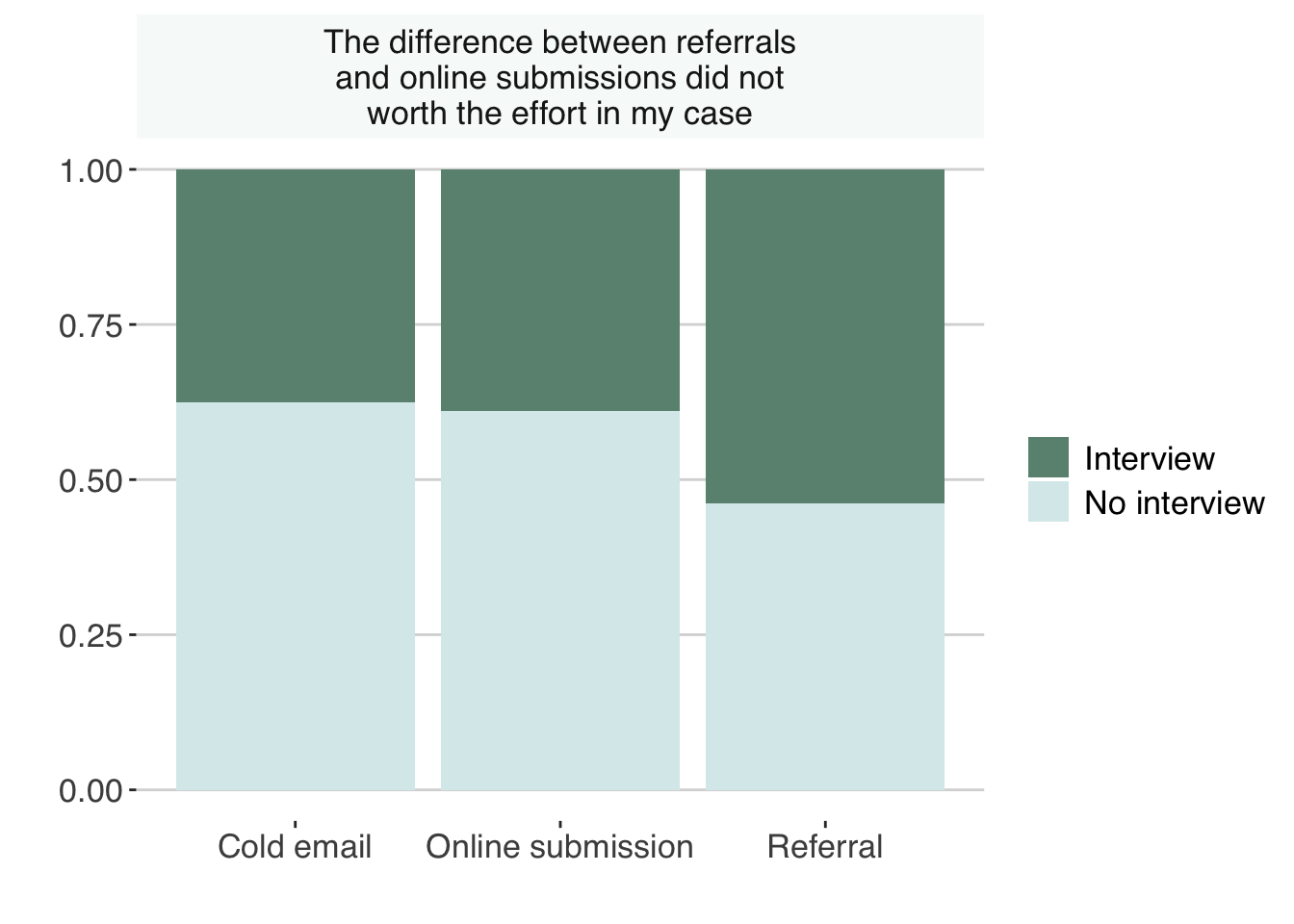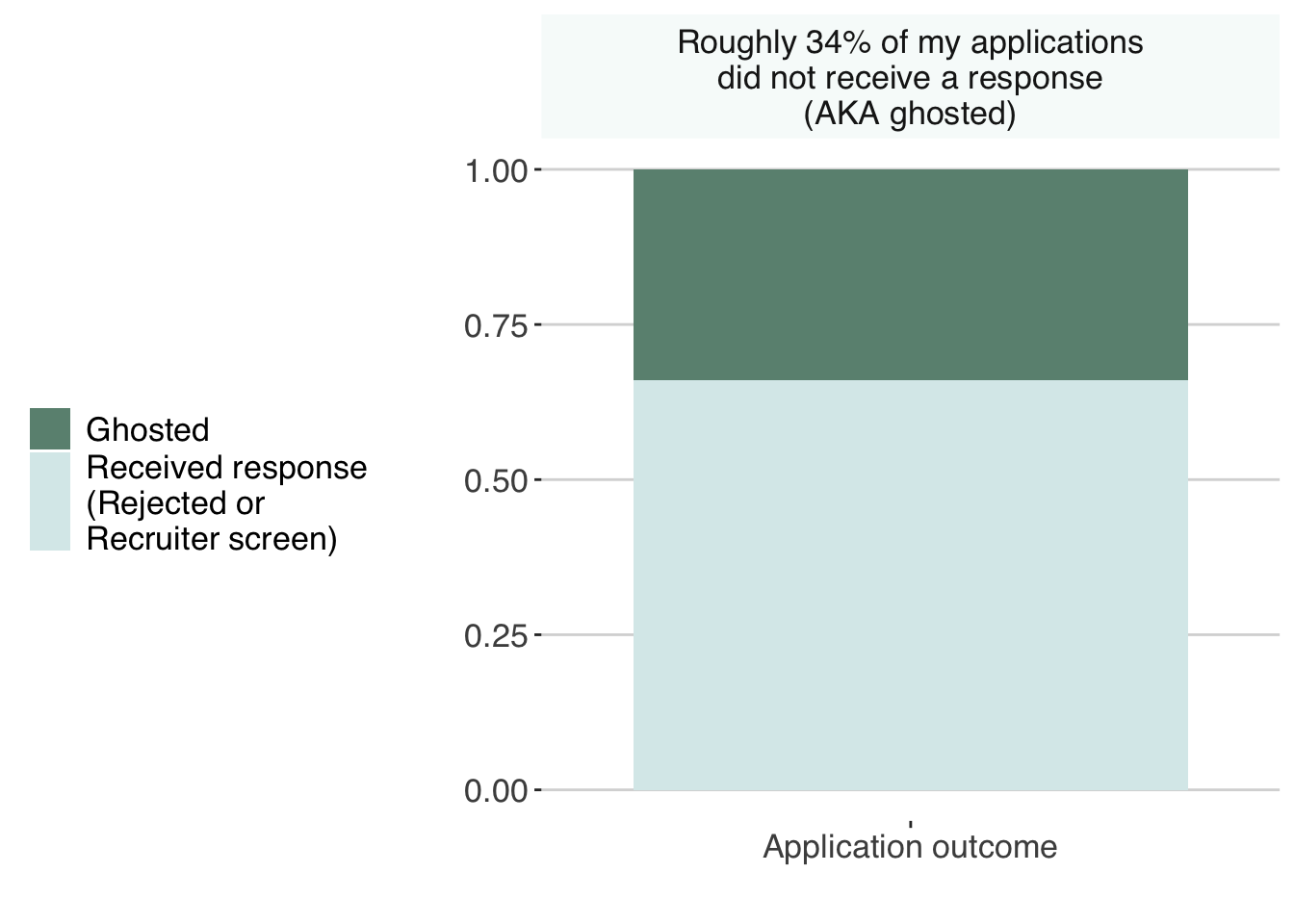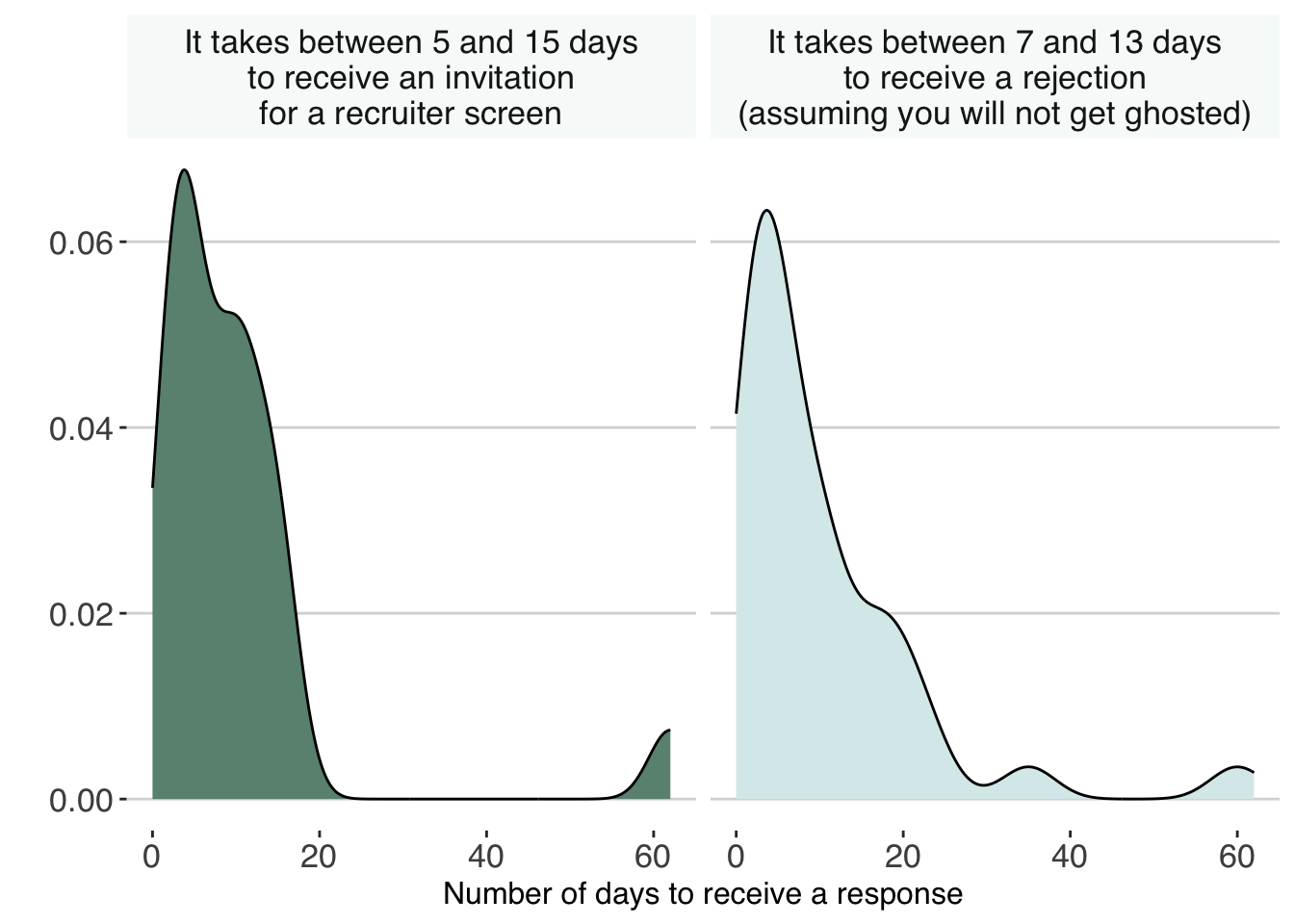9 The application process and some personal statisctis
Most interview prep books start by discussing the application process. I believe that you should not start applying to job up until roughly 1 week before you are ready to interview. That is why I left this discussion for the end. In this chapter, I will cover:
- Resume review
- Apply to openings
- Recruiter screening
9.1 Resume review
Question: What should my resume look like to attract the most attention?
Answer: Resume writing is extremely subjective. Most likely, there are no two people in the world who will agree on an optimal resume. :) I personally had my resume extensively reviewed by FAANG hiring managers, recruiters, and outside services. There was absolutely zero consensus:
Some would say there is no need for a short summary, while others liked it.
Some would say that I should absolutely have a 1-page resume (I was applying for staff+ roles), others they suggested that my 2-page resume is too short.
Some would say that I should list my technical/programming skills at the top, others, they didn’t care.
The above list of disagreements goes on and on.
Having said that, I do believe that there are certain guidelines you should absolutely follow:
- Your title matters, a lot. Recruiters/hiring managers might skip your resume if your title does not seem relevant:
- If you have a PhD or an MSc, list it in your title, i.e.,
Name, PhD. - If you have worked or currently working at a FAANG/top tier company, list it in your title, e.g., “Data Scientist at FAANG” or “Data Scientist | ex-FAANG”
- If you are applying to a different role than your current role, make sure you adjust your title to match as much as possible without lying. For instance, if you are applying for an MLE role but you have more of a DS/science experience, maybe right “Machine Learning Scientist” or “Applied Scientist”.
- If you have a PhD or an MSc, list it in your title, i.e.,
- If you are new a grad, your resume should not be more than one page, period. If you are a senior+, your resume can be longer – it is not a big deal. Recruiters/hiring managers will focus on what they are looking for.
- When listing a project that you worked on on your resume:
- Make sure you list the project’s business impact. Improving performance by x% is not business impact. Business impact means revenue (or revenue-adjacent impact such as user engagement, user retention, etc.)
- Make sure you clarify your role in the project. Use strong words such as “led” instead of “participated” when appropriate.
- This is a personal preference, but consider listing the technical skills you used for each listed project. This way, you show evidence that for example, you use LLMs, PyTorch, etc.
- Recruiters are a little bit obsessed with listing your skills at the top, and not including a summary. I have mixed feelings about these two points, and I am actually doing the exact opposite: I have a short, 3-line summary of who I am, and list my technical skills at the bottom of my resume on page 2. The reason I chose to have my resume this way is that my unique experience separates me from the crowd: knowing Python or PyTorch does not. I think again, if you are a new grad, you should probably avoid a summary and start with your technical skills. However, I strongly believe that if you are an experienced data scientist or engineer, it makes more sense to showcase your uniqueness at the beginning of your resume.
- The internet will tell you to customize your resume based on the role that you are applying to. I find this advice ridiculous. You either apply to jobs that you are a good match or you are just spraying and praying, which will not work regardless. If you are applying to multiple roles (e.g., PDS and DS) it is totally ok to have two resumes, e.g., one for PDS emphasizing your work on metrics and AB testing, and one for DS emphasizing your work on modeling. However, adjusting your resume to match the opening requirements is just bad advice.
9.2 Referrals vs. online applications
Question: Do referrals work better than online submissions? What about cold reachouts?
Answer: There are three ways to submit job applications:
— Online submission
— Online submission + cold message to hiring manager/recruiter
— Apply through a referral
When I decided to leave academia, I was repeatedly told by industry friends that I should always get a referral instead of blindly applying online. And so I did. I reached out to friends of friends on LinkedIn and did my best to get as many referrals as possible. Here is what I’ve learned through this process: Not all referrals are created equal. Getting a referral from a director is really worth it. Getting a referral from a junior makes literally no difference. So if you are an extrovert and enjoy talking with people and making connections, by all means get as many referrals as you can. But if you are like me, a bit of an introvert, and you feel anxious every time you ask a friend for a referral, just don’t bother. Go on and apply online, message the hiring managers when you can, and that will work just fine as well.
The figure below shows some personal statistics of my very first year after leaving academia. I have submitted applications to 47 (big) tech companies; For 13 of these companies, I had a referral; For 16 of these companies, I reached out to recruiters/hiring managers that I didn’t know. For 18 companies, I just applied online without contacting anyone.

9.3 Response time
Question: How long does it take to hear back after applying? How long does it take to hear back after a screen/final onsite round?
Answer: First, let me address ghosting. You should not have any expectation that your recruiter will get back to you. If you do, you will get extreme anxiety and, potentially, depression. Recruiters will ghost you. Repeatedly.
At the same time, as long as you move along the process, your recruiter is your best friend. Your incentives, quite surprisingly, are aligned. You want to get the maximum compensation possible, and they want to make sure that you accept the offer. So they will fight for you, of course, within their limits, and as long as there is some common ground between the offer and your expectations.
So how often do you get ghosted? Across all of my applications over the years, I get ghosted roughly 34% of the time.

For the applications that I did receive a response, on average it took 10 days, with a 95% confidence interval between 7 and 13 days! For successful applications (i.e., those that resulted in a recruiter screen), response time is about the same, on average 10 days, with 95% CI between 5 and 15 days (fewer observations). Below I show the distributions of each group:

9.4 Timeline: from application to offer
Question: What is the timeline from application to offer?
Answer: It varies, a lot, and in fact, most of he time, the bottleneck tends to be you, i.e., the candidate. :)
Let’s assume that you are ready to interview at a moment’s notice (no other interviews, no job, no family responsibilities). Let’s also assume that the interview process involves three steps:
- A recruiter screen (15 to 30 minutes)
- A technical screen (45 minutes to an hour)
- A virtual onsite (5 to 6 hours)
The absolutely best case scenario is shown below:

So even in this scenario, you should expect that at best, you will sign an offer roughly 50 days after you apply for a job. In practice, it is more rational to assume that you will accept an offer roughly 60 days after you apply. The main reason is that you will try to schedule multiple final interviews at the same time, which will require a lot of scheduling maneuvering. At the same time, most companies take longer than 3 days to decide whether to make an offer or to move you to the next step, and the communication with the schedulers is not as smooth as assumed in the picture. Finally, many companies have an extra screening round, typically with a hiring manager, which also prolongs the above timeline.
9.5 Questions worksheet (recruiter-screen)
Question: How should you prepare for the recruiter screen? (see solution for relevant worksheet)
Answer: The type of recruiter screen calls vary tremendously. Some of these calls will be completely procedural (i.e., the hiring manager has already picked you for the interview and the recruiter will only ask about your availability and interest in the role). Other recruiter screens are more serious and require significant prep time. Before a recruiter screen, make sure you have clear answers to the following:
Tell me about yourself (2-5 min summary). This part should make it clear why you are a good fit for the role you are applying to.
What are you looking for in your new job?
Why are you leaving your current company?
Why do you want to work for us? (company you are applying to?)
Describe a project you currently working on (without technical details – communicate why it is important for business)
Prepare a few more projects in case they ask for more.
Make sure you can speak to any of the projects listed on your resume – recruiters sometimes will randomly choose a bullet point from your resume and ask you to talk about it.
Prepare several questions to ask, especially about the hiring process and the company
9.6 Interview success probability
Question: What is the probability of receiving an offer?
Answer: The answer to this question really depends on you, your background, credentials, experience, and prep. I will only share below my own statistics, but keep in mind that these statistics include:
- Transitions from academia to DS and from DS To MLE
- During the majority of these interviews, I had a full-time demanding FAANG job that did not allow me to fully prepare.
- The stats cover 2022H2, 2023, and 2024 – so def some of the worst periods in tech.
| Event | Probability |
|---|---|
| Pr(Offer | Onsite) | 0.4375 |
| Pr(Offer | Tech screen) | 0.255 |
| Pr(Offer | Recruiter screen) | 0.126 |
| Pr(Offer | Applied) | 0.028 |
| Pr(Onsite | Tech Screen) | 0.582 |
| Pr(Interview | Applied) | 0.219 |
comments@madinterview.com independent of whether you think they are good or not. I will be updating this response as I receive more data points.
9.7 Up-level during interview
Question: Should you apply to lower-level roles and try to uplevel during the interview?
Answer: There is almost zero chance you will manage to get up-leveled during the interview, unless you are applying for level-agnostic roles (FAANG used to have level-agnostic openings, but it gets rarer in this market). The reason typically has to do with budgetary and scope constraints and nothing with your particular performance.
In fact, it used to be (before 2022Q4) that if you didn’t do great, a company would just downlevel you and still make you an offer. This is not the case anymore since companies are looking for very specific roles to fill.
In short: apply only for roles you would be willing to take. You can always try to uplevel during the process, but chances are you won’t be successful in doing so.
9.8 Offer validity and cooling-off periods
Question: Is my offer valid for a year? Do I really need to wait for 6 months to apply again if I don’t get an offer?
Answer: These two are quite loaded questions.
Most companies that make you an offer will be in theory willing to hire you within 6 months or so. However, there is a catch: it is highly unlikely that there will be a position that you are a good match, again. This is 2023/2024 and not 2021. :) So when you reject an offer, expect that you won’t have the chance to take that offer later without re-interviewing. Even in the event that there is an opening that you are a good fit for, you will need to re-chat with the hiring manager (most likely it will be a different hiring manager) and who knows how that conversation will go…
In many cases, you do not need to wait 6 months to re-apply. Time after time I saw this rule being overridden. In fact the more senior you are, the less this rule applies to you. Sure, if you are a new grad, you will need to wait to re-apply since there are so many new grads on the market and companies can choose. However, for staff+ roles, these rules do not apply. You only need a good-fit role to open and you can chat with the hiring manager directly.